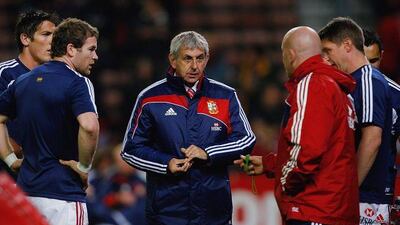My old secondary school, despite being a run-of-the-mill state institution, had delusions of grandeur and, like any English school with ideas above its station, had a Latin motto, "Sto Ut Servium". It means "We Stand To Serve", an echo of the poet John Milton's famous gag: they also serve who only stand and wait.
Milton's line was a reference to his blindness, a declaration that despite his disability he had a purpose in life, so it is probably a little disrespectful to apply the great man's words to a game of rugby football. They resonated with me, however, thinking about the British & Irish Lions squad, for some of whom the realisation must have dawned that they are destined to play no more than a supporting role in South Africa 2009.
They have served, by metaphorically standing and waiting, gamely trying to catch coach Ian McGeechan's eye in midweek tour matches. But when the team for today's second Test in Pretoria was posted up in the team hotel last night, for some there will have been only disappointment. Should unlikely heroics lead to the Lions levelling the series, little of the credit will go the way of those who failed to make the cut.
The taste will be particularly bitter for Shane Williams and Ronan O'Gara who will be warming the bench. They are of an age - they are both 32 - that makes a return unlikely when battle is recommenced in Australia in 2013. I hope they will not be too downhearted, though, because being a squad member in a major tournament is a vital position that has historically been undervalued. Only now, with the increasing stress on the psychological aspect of sport, is the importance of the part played by these spear-carriers being recognised. Sure, Williams and O'Gara may be reduced to holding tackle bags for the others, but in the overall context of facing the world champions in hostile territory, they do much more.
The debate about the nearly men has been re-ignited in the UK by a belated decision to award winners' medals to the so-called forgotten boys of 1966, the players who were part of Alf Ramsey's World Cup-winning squad, but failed to appear on that memorable Saturday in July. Some of them - like talented winger Terry Paine - were victims of Ramsey's so-called "wingless wonders" formation, while others like Jimmy Greaves missed a group match through injury and could not get back in the team. Some people criticised the decision to hand out these medals, but former Arsenal striker Ian Wright, whose England career was spent in the shadow of Gary Lineker and Alan Shearer, says one should not underestimate the difficulty of remaining positive in those circumstances, subsuming your bitterness and ensuring morale does not slip.
Success is a team effort, says Wright, and that includes those who stand and wait - in South Africa as much as in North London all those years ago. Interestingly, British Prime Minister Gordon Brown, who probably welcomed a little kudos by association, gave the forgotten boys of '66 a reception at 10 Downing Street. One wonders if Brown thinks back fondly to the time when he was just a squad member for Tony Blair rather than being in charge of the whole team.
mkelner@thenational.ae

